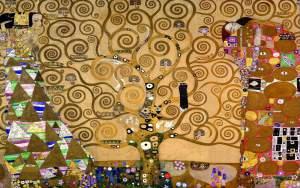
Gustav Klimt, The Tree of Life
So last week—along with seemingly everyone else in Southeast Portland—we found ourselves in a battle with lice. Over the past few years, it seems like every school listserv is abuzz with warnings about head lice outbreaks, regardless of the age of the kids. There are all sorts of theories about why lice infestations are so much more common now—climate change, resistance to the pesticide treatments. In fact, one woman told me she thought the lice problem was worse now because kids all had their heads bowed over their smart phones, so they were touching each other, crown to crown.
Anyway, we launched into action, using a multi-day treatment made up of a mix of oils—olive, tea tree, rosemary. I’m as squeamish as the next person, but as my friend Mark—whose wife is battling cancer—says, this is an obstacle we can overcome. We went through the first treatment, no problem. Sure it was messy and time-consuming, and the girls hated the long periods of sitting while I combed through one hair at a time. I complained to David: They don’t tell you about this in What to Expect When You’re Expecting. But really, in the scheme of things, no big deal.
I really started thinking about the strangeness of humans, though, during the second treatment. Violet had asked a couple of times over the preceding days: What difference does it make, anyway? Why would it matter if everyone just had lice in their hair? My answer was pretty straightforward: Because it’s disgusting.
But during her second treatment, I’m combing and combing and not really finding anything. By the end, there were just two or three miniscule black dots, so small almost that I could almost not see them at all. As she got up to head to the shower, Violet offhandedly observed: They’re so tiny. I think they were probably just born today. Then, she hustled off to rinse the smelly oil out of her hair.
That sentence stopped me in my tracks. In fact, it was one word: born. The lice were just born that day. They were a creatures that were born and then died all in the same day. And suddenly, if lice were something that were born, I felt differently about them. I felt a different sense of responsibility. Truth be told, I felt a different sense of kinship.
Don’t get me wrong. I am not a fan of Violet’s theory of universal lice infestation. I do not want to live in a world where we are all host to whatever manner of creatures come along. But to some extent, we already are. I don’t like to think about dust mites, and the whole probiotic craze that is intended to seed the digestive tract with micro-organisms has hit every mainstream magazine.
But Violet’s off-hand observation about the baby lice—as I had started thinking about them—reminded me of our place in the universe. Or really, made me wonder about it. It made me feel both bigger and more callous—spending hours in the quest to kill less than 10 tiny bugs; and smaller—as I think about how miniscule we are compared to the planet, the solar system, the universe, as I think about the relatively few days that we are granted between the time we are born and the time we die. It filled me with wistfulness about the frailty and mystery of life itself, and made me laugh out loud about what we decide we must doggedly eradicate. For a minute, Violet and her baby lice got me all mixed up about what is beautiful and what is ugly, what is tender and what is revolting, what is earthly and what is divine.
Her baby lice sent me searching for a poem I read last fall by the tremendous and under-appreciated Atsuro Riley. And here it is:
Thicket
We come gnawed by need on hands and knees.
As a creature (nosing) grubble-seeks a spring.
As bendy-spined as bandy snakes through saltshrub yaupon
needle-brake.
For darkling green;
for thorn-surround.
This absorbing
quaggy
crample-ground.
Of briar-canes (intervolved with kudzu-mesh) and mold.
Of these convoluted vines we grasp to suck.
To taste the pith —
the lumen the cell-sap pulse.
To try to know
some (soursharp) something about something.
Lumen is as lumen does.
‘A little room for turmoil to grow lucid in.’
In here where Clary set her cart-tongue down (and dug, and brailled).
In here where Tynan breathed.
We grasp to suck to taste what light.
Let loose the bale that bows us down.
— Bow down.
So that’s it, I guess. In the face of the mysteries of baby lice and bandy snakes, lumen is as lumen does. And yes, bow down. What is left to do is to bow down.
